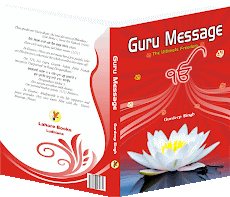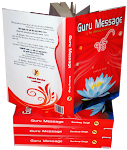My Sikh brothers and sisters read Gurbani every day; they are devoted to Gurbani, but I haven’t met yet anyone who can make me realize Prabh’s presence anywhere else as Sri Guru Granth Sahib does. It is interesting that we all are interested to have an experience of being with the Creator, but we fail. The reasons of our failure are not unknown to us. Gurbani also says that by merely saying or talking or studying a lot about the Creator, the experience with His presence is not materialized (59, SGGS). Studying Gurbani repeatedly, we come across some shabdas that show us a mirror; what we see in that mirror is our reflections or the background; surprisingly, the one we want to envision, the Creator, remains missing. Gurbani actually gives reasons of that: we have built a pretty strong wall of our conceit, attachment and greed that triggers many negative passions to take over us. A dear friend of mine has explained that the concepts of the Creator we have made in our minds depending on the interpretation of Gurbani to date, is not what Gurbani tells. He explains what is left out in the concept of the Creator; he has shown me why we need to see carefully the words like Gur, Gur (u) and Guroo on the basis of Gurbani Grammar; Sometimes because of our alliance with some groups, we refuge to accept anything new If anyone tries to tell us; for us, looking at other side to see a different concept of Gur, Guru and Guroo, becomes difficult, because then the concepts we have built in our minds, start tumbling down. In other words, we want to be in a denial and ready to reject outright that concept, which very well exists in Gurbani. If we look at the word Gur, in some instances, addressed to Ekkankar, we understand that it is the Creator who runs the entire show; the word Gur(u), makes it clear that it is Akalpurakh who guides the mortals through His medium, and we can easily understand that why the grace of Ekkankar is stressed repeatedly; indeed, there are some exceptions depending upon the contexts.
The Creator, Ekkankaar, is spread in and out in waves; in this universe, literally there is none but Him; the Guru says that being in the lives, the Creator experiences everything (23 SGGS), and thus Prabh knows everything. He is beyond birth because His totality cannot be curbed in “birth concept”. Prabh is said to be at His own (Japji); the Guru uses a word “swambh” for that”. His presence in waves creates energy of different kinds; this energy guides, creates and destroys. To elaborate on this is very arduous job; I shall share with you in a nut shell how He is present in us but how we fail to see His presence. In Gurbani, it is only Prabh (the Creator) and the eminent manifestation of Prabh Jyoti who are revered highly; however, the Creator is never reduced to one form. All people are deemed as good by Guru Nanak (991 SGGS); this approach doesn’t fit well in our world plagued by conflicts, and because of that, the whole issue is dragged to different directions. I know my Sikh brothers and sisters have got into various groups, and the groups they have joined have built their new worlds; however, a few glimpses of Gurbani ideology do exist in all of the groups. As they are committed to their respective groups more than anything else, they have also built strong fortress around their relative groups. Looking out of these groups has become extremely difficult for them and the freedom our Gurus have created for us, thus, is mortgaged to the group mentality. Consequently, beholding the Creator in His creation becomes very tough.
Let us for a short time, we together look at Gurbani given concepts that are above all the fortresses we live in. Please read carefully the following Gurbani verses on 275 SGGS by Fifth Nanak:
Pasri▫o āp ho▫e anaṯ ṯarang. Lakẖe na jāhi pārbarahm ke rang.
In Essence: The Creator is expanded through endless waves; His plays cannot be expressed.
Jaisī maṯ ḏe▫e ṯaisā pargās. Pārbarahm karṯā abinās.
As per Prabh’s given understanding, the mortal makes display of his mind; Akalpurakh is the Creator and He is Imperishable.
Obviously, we are advised to look at the Creator expanded in waves to the infinity and to believe that He is the Creator who is beyond death and birth. As per given intellect, we all display our understanding about Him and other things. If we study the structure of matter waves, we will certainly know how His “all pervading power” works. Gurbani also states that though the Creator permeates in His creation, but He is also separate from it (966 SGGS); this statement takes us beyond the concept of matter waves, and restricting Him to merely matter appears then a fallacy.
Now let us look at the following shabda on 831 in Raag Bilawal by First Nanak:
Nikat vasai ḏekẖai sabẖ so▫ī. Gurmukẖ virlā būjẖai ko▫ī. viṇ bẖai pa▫i▫ai bẖagaṯ na ho▫ī. Sabaḏ raṯe saḏā sukẖ ho▫ī. ||1||
In Essence: Akalpurakh lives close by, and only He takes care of all. A rare Guru follower understands this. Without developing the fear of the Creator, His devotion is not possible (fear of His being present and to avoid evil acts). By getting drenched in the Guru Shabada (that teaches how to love and praise Him and how to respect and fear Him), ever peace is obtained.
In above verses, the Guru gives divine knowledge about His all pervading reality and he guides us how to rightfully perform His devotion to secure ever peace.
ਪਰਮਾਤਮਾ (ਹਰੇਕ ਜੀਵ ਦੇ) ਨੇੜੇ ਵੱਸਦਾ ਹੈ, ਉਹ ਆਪ ਹੀ ਹਰੇਕ ਦੀ ਸੰਭਾਲ ਕਰਦਾ ਹੈ, ਪਰ ਇਹ ਭੇਤ ਕੋਈ ਵਿਰਲਾ ਬੰਦਾ ਸਮਝਦਾ ਹੈ ਜੋ ਗੁਰੂ ਦੇ ਸਨਮੁਖ ਰਹਿ ਕੇ ਨਾਮ ਜਪਦਾ ਹੈ। ਜਿਤਨਾ ਚਿਰ (ਇਹ) ਡਰ ਪੈਦਾ ਹੋਵੇ (ਕਿ ਉਹ ਹਰ ਵੇਲੇ ਨੇੜੇ ਵੇਖ ਰਿਹਾ ਹੈ) ਪਰਮਾਤਮਾ ਦੀ ਭਗਤੀ ਨਹੀਂ ਹੋ ਸਕਦੀ। ਜੇਹੜੇ ਬੰਦੇ ਗੁਰੂ ਦੇ ਸ਼ਬਦ ਦੀ ਰਾਹੀਂ (ਨਾਮ-ਰੰਗ ਵਿਚ) ਰੰਗੇ ਜਾਂਦੇ ਹਨ ਉਹਨਾਂ ਨੂੰ ਸਦਾ ਆਤਮਕ ਆਨੰਦ ਮਿਲਦਾ ਹੈ।੧।
Aisā gi▫ān paḏārath nām. Gurmukẖ pāvas ras ras mān. ||1|| rahā▫o.
In Essence: Such is the divine knowledge of His Naamu that the Guru follower obtains honor by getting drenched in His love. (Pause)
ਗਿਆਨੁ = (ਪਰਮਾਤਮਾ ਨਾਲ) ਡੂੰਘੀ ਸਾਂਝ। ਗੁਰਮੁਖਿ = ਉਹ ਮਨੁੱਖ ਜੋ ਗੁਰੂ ਵਲ ਮੂੰਹ ਰੱਖਦਾ ਹੈ। ਪਾਵਸਿ = ਹਾਸਲ ਕਰੇਗਾ। ਰਸਿ = (ਨਾਮ ਦੇ) ਰਸ ਵਿਚ। ਰਸਿ = ਰਸ ਕੇ, ਭਿੱਜ ਕੇ। ਮਾਨੁ = ਆਦਰ।੧।ਰਹਾਉ।
ਪਰਮਾਤਮਾ ਦਾ ਨਾਮ ਇਕ ਅਜੇਹਾ (ਸ੍ਰੇਸ਼ਟ) ਪਦਾਰਥ ਹੈ ਜੋ ਪਰਮਾਤਮਾ ਨਾਲ ਡੂੰਘੀ ਸਾਂਝ ਪੈਦਾ ਕਰ ਦੇਂਦਾ ਹੈ। ਜੇਹੜਾ ਮਨੁੱਖ ਗੁਰੂ ਦੇ ਸਨਮੁਖ ਹੋ ਕੇ (ਇਹ ਪਦਾਰਥ) ਹਾਸਲ ਕਰਦਾ ਹੈ, ਉਹ (ਇਸ ਦੇ) ਰਸ ਵਿਚ ਭਿੱਜ ਕੇ (ਲੋਕ ਪਰਲੋਕ ਵਿਚ) ਆਦਰ ਪਾਂਦਾ ਹੈ।੧।ਰਹਾਉ।
Gi▫ān gi▫ān kathai sabẖ ko▫ī. Kath kath bāḏ kare ḏukẖ ho▫ī. Kath kahṇai ṯe rahai na ko▫ī. Bin ras rāṯe mukaṯ na ho▫ī. ||2||
In Essence: Everybody talks about divine knowledge about the Creator. Indulging in arguments brings pain.( as a person gets into argument about all this, he or she endures pain. Truth is this that a person interested only in arguments, just cannot stay away from such arguments because of the habit); however, without getting drenched in His love, no one gets liberated.
Above verses are very important to look at the reason why we become stagnant in spiritual progression. After studying about divine knowledge, instead of utilizing that divine knowledge given by the Guru for spiritual progress, we get into an argument with others to state that we know better than others; this becomes our habit and we become stagnant in spiritual progression, How to utilize that knowledge for our goal, is reduced to satisfy “the self”
ਕਥੈ = ਆਖਦਾ ਹੈ। ਸਭੁ ਕੋਈ = ਹਰੇਕ ਜੀਵ। ਕਥਿ ਕਥਿ = (ਗਿਆਨ = ਚਰਚਾ) ਆਖ ਆਖ ਕੇ। ਬਾਦੁ = ਚਰਚਾ। ਕਥਿ = ਕਥ ਕੇ, ਆਖ ਕੇ। ਕਹਣੈ ਤੇ = ਕਹਿਣ ਤੋਂ, ਚਰਚਾ ਕਰਨ ਤੋਂ। ਰਹੈ ਨ = ਹਟਦਾ ਨਹੀਂ। ਮੁਕਤਿ = (ਵਿਕਾਰਾਂ ਤੋਂ) ਖ਼ਲਾਸੀ।੨।
(ਜ਼ਬਾਨੀ ਜ਼ਬਾਨੀ ਤਾਂ) ਹਰ ਕੋਈ ਆਖਦਾ ਹੈ (ਕਿ ਮੈਨੂੰ ਪਰਮਾਤਮਾ ਦਾ) ਗਿਆਨ (ਪ੍ਰਾਪਤ ਹੋ ਗਿਆ ਹੈ,) ਗਿਆਨ (ਮਿਲ ਗਿਆ ਹੈ), (ਜਿਉਂ ਜਿਉਂ ਗਿਆਨ ਗਿਆਨ) ਆਖ ਕੇ ਚਰਚਾ ਕਰਦਾ ਹੈ (ਉਸ ਚਰਚਾ ਵਿਚੋਂ) ਕਲੇਸ਼ ਹੀ ਪੈਦਾ ਹੁੰਦਾ ਹੈ। ਚਰਚਾ ਕਰ ਕੇ (ਅਜੇਹੀ ਆਦਤ ਪੈ ਜਾਂਦੀ ਹੈ ਕਿ) ਚਰਚਾ ਕਰਨ ਤੋਂ ਜੀਵ ਹਟਦਾ ਭੀ ਨਹੀਂ। (ਪਰ ਚਰਚਾ ਤੋਂ ਕੋਈ ਆਤਮਕ ਆਨੰਦ ਨਹੀਂ ਮਿਲਦਾ, ਕਿਉਂਕਿ) ਪਰਮਾਤਮਾ ਦੇ ਨਾਮ-ਰਸ ਵਿਚ ਰੰਗੇ ਜਾਣ ਤੋਂ ਬਿਨਾ ਵਿਕਾਰਾਂ ਤੋਂ ਖ਼ਲਾਸੀ ਨਹੀਂ ਮਿਲਦੀ।੨।
Gi▫ān ḏẖi▫ān sabẖ gur ṯe ho▫ī. Sācẖī rahaṯ sācẖā man so▫ī. Manmukẖ kathnī hai par rahaṯ na ho▫ī. Nāvhu bẖūle thā▫o na ko▫ī. ||3||
In Essence: the Divine knowledge and meditation are leaned from the Guru. (As per the Guru – guidance) When we make our lives sublime, then Akalpurakh abides within us. The mind – slaves just talk but do not practice what they say. Thus, forgetting Prabh Naam, they obtain no place of stability.
The Guru is a medium between the Creator and us (Gurbani also addresses the Guru as broker: 964, SGGS); to become one with the Creator, first we need to get rid of our conceit that magnifies our sense of “self”; Gurbani advises us to live like a dead person which means by surrendering to the Guru and Akalpurakh, we should become embodiment of humbleness; it is a path we need to tread on first. Once we have obtained the divine knowledge from shabdu Guru, we do not need to indulge into argument; instead, we should try to apply that knowledge to guide our ways of living. In the guided life by the Guru, Hari Naamu – praise is a part and parcel to see the Creator in all regardless the way of living and thinking of different people.
In the following verses, the Guru points out the mind- slaves’ fall; there is very good advice for us who intend to follow our Guru:
ਗੁਰ ਤੇ = ਗੁਰੂ ਤੋਂ, ਗੁਰੂ ਪਾਸੋਂ। ਧਿਆਨੁ = ਪ੍ਰਭੂ ਵਿਚ ਸੁਰਤਿ ਦਾ ਟਿਕਾਓ। ਰਹਤ = ਰਹਿਣੀ, ਆਚਰਨ। ਸਾਚਾ = ਸਦਾ-ਥਿਰ ਪ੍ਰਭੂ। ਮਨਿ = ਮਨ ਵਿਚ। ਪਰੁ = ਪਰੰਤੂ। ਨਾਵਹੁ = ਨਾਮ ਤੋਂ।੩।
ਪਰਮਾਤਮਾ ਨਾਲ ਡੂੰਘੀ ਸਾਂਝ ਤੇ ਉਸ ਵਿਚ ਸੁਰਤਿ ਦਾ ਟਿਕਾਉ-ਇਹ ਸਭ ਕੁਝ ਗੁਰੂ ਤੋਂ ਹੀ ਮਿਲਦਾ ਹੈ। (ਜਿਸ ਨੂੰ ਮਿਲਦਾ ਹੈ ਉਸ ਦੀ) ਰਹਿਣੀ ਪਵਿਤ੍ਰ ਹੋ ਜਾਂਦੀ ਹੈ ਉਸ ਦੇ ਮਨ ਵਿਚ ਉਹ ਸਦਾ-ਥਿਰ ਪ੍ਰਭੂ ਵੱਸ ਪੈਂਦਾ ਹੈ। ਆਪਣੇ ਮਨ ਦੇ ਪਿੱਛੇ ਤੁਰਨ ਵਾਲਾ ਬੰਦਾ (ਗਿਆਨ ਦੀਆਂ ਨਿਰੀਆਂ) ਗੱਲਾਂ ਹੀ ਕਰਦਾ ਹੈ, ਪਰ ਉਸ ਦੀ ਰਹਿਣੀ (ਪਵਿਤ੍ਰ) ਨਹੀਂ ਹੁੰਦੀ। ਪਰਮਾਤਮਾ ਦੇ ਨਾਮ ਤੋਂ ਖੁੰਝੇ ਹੋਏ ਨੂੰ (ਮਾਇਆ ਦੀ ਭਟਕਣ ਤੋਂ ਬਚਣ ਲਈ) ਕੋਈ ਆਸਰਾ ਨਹੀਂ ਮਿਲਦਾ।੩।
Man mā▫i▫ā banḏẖi▫o sar jāl. Gẖat gẖat bi▫āp rahi▫o bikẖ nāl. Jo āʼnjai so ḏīsai kāl. Kāraj sīḏẖo riḏai samĥāl. ||4||
In essence: The mind is caught in a net of Maya; though Prabh permeates in all, Maya poison too remains in all; the one who is brought into this world, is destined to die, and by contemplating the Creator in the heart, the goal (of uniting with Pabh) is attained.
It is now clear that as Prabh permeates in everyone, Maya also remains present to poison everyone; there are two now with us, Prabh and Maya; to be one with Prabh, we need to eradicate the presence of Maya. Here lies the answer behind our failure in envisioning the Creator. What we wear, what we do in the name of our religion and what we claim in context of our spiritual progress are all fake if Maya and its influences remain guiding us.
ਸਰ ਜਾਲਿ = (ਮੋਹ ਦੇ) ਤੀਰਾਂ ਦੇ ਜਾਲ ਵਿਚ। ਬੰਧਿਓ = ਬੰਨਿ੍ਹਆ ਹੋਇਆ ਹੈ। ਬਿਖੁ = ਮਾਇਆ-ਜ਼ਹਿਰ। ਆਂਜੈ = ਲਿਆਇਆ ਜਾਂਦਾ ਹੈ, ਜੰਮਦਾ ਹੈ। ਕਾਲਿ = ਕਾਲ ਵਿਚ, ਕਾਲ ਦੇ ਵੱਸ ਵਿਚ, ਆਤਮਕ ਮੌਤ ਦੇ ਅਧੀਨ। ਕਾਰਜੁ = (ਮਨੁੱਖਾ ਜੀਵਨ ਵਿਚ ਕਰਣ-ਯੋਗ) ਕੰਮ। ਸੀਧੋ = ਸਫਲ।੪।
ਮਾਇਆ ਨੇ (ਜੀਵਾਂ ਦੇ) ਮਨ ਨੂੰ (ਮੋਹ ਦੇ) ਤੀਰਾਂ ਦੇ ਜਾਲ ਵਿਚ ਬੰਨਿ੍ਹਆ ਹੋਇਆ ਹੈ। (ਭਾਵੇਂ ਪਰਮਾਤਮਾ) ਹਰੇਕ ਸਰੀਰ ਵਿਚ ਮੌਜੂਦ ਹੈ, ਪਰ (ਮਾਇਆ ਦੇ ਮੋਹ ਦਾ) ਜ਼ਹਿਰ ਭੀ ਹਰੇਕ ਦੇ ਅੰਦਰ ਹੀ ਹੈ, (ਇਸ ਵਾਸਤੇ) ਜੋ ਭੀ (ਜਗਤ ਵਿਚ) ਜੰਮਦਾ ਹੈ ਉਹ ਆਤਮਕ ਮੌਤ ਦੇ ਵੱਸ ਵਿਚ ਦਿੱਸ ਰਿਹਾ ਹੈ। ਪਰਮਾਤਮਾ ਨੂੰ ਹਿਰਦੇ ਵਿਚ ਯਾਦ ਕਰਨ ਨਾਲ ਹੀ (ਮਨੁੱਖਾ ਜੀਵਨ ਵਿਚ) ਕਰਨ-ਜੋਗ ਕੰਮ ਸਿਰੇ ਚੜ੍ਹਦਾ ਹੈ।੪।
So gi▫ānī jin sabaḏ liv lā▫ī. Manmukẖ ha▫umai paṯ gavā▫ī. Āpe karṯai bẖagaṯ karā▫ī. Gurmukẖ āpe ḏe vadi▫ā▫ī. ||5||
In Essence: only that person is a divine scholar who is enveloped in the Guru Shabada. The mind slaves lose their honor because of their self conceit. Only the Creator causes the mortal to do s devotiionHis devotion. Thus, only the Creator blesses the Guru follower with glory.
The Divine knowledge is that because of which one becomes one with the Creator; otherwise, it is just a net of words uttered or written by people. Self conceit leads to loss.
ਜਿਨਿ = ਜਿਸ ਨੇ। ਲਿਵ = ਲਗਨ। ਪਤਿ = ਇੱਜ਼ਤ। ਕਰਤੈ = ਕਰਤਾਰ ਨੇ।੫।
ਉਹੀ ਮਨੁੱਖ ਗਿਆਨ-ਵਾਨ (ਅਖਵਾ ਸਕਦਾ) ਹੈ ਜਿਸ ਨੇ ਗੁਰੂ ਦੇ ਸ਼ਬਦ ਦੀ ਰਾਹੀਂ ਪ੍ਰਭੂ-ਚਰਨਾਂ ਵਿਚ ਸੁਰਤਿ ਜੋੜੀ ਹੈ। ਆਪਣੇ ਮਨ ਦੇ ਪਿੱਛੇ ਤੁਰਨ ਵਾਲਾ ਮਨੁੱਖ ਹਉਮੈ ਦੇ ਅਧੀਨ ਰਹਿ ਕੇ ਆਪਣੀ ਇੱਜ਼ਤ ਗਵਾਂਦਾ ਹੈ। (ਪਰ ਜੀਵ ਦੇ ਭੀ ਕੀਹ ਵੱਸ?) ਪਰਮਾਤਮਾ ਆਪ ਹੀ ਆਪਣੀ ਭਗਤੀ (ਜੀਵਾਂ ਪਾਸੋਂ) ਕਰਾਂਦਾ ਹੈ, ਆਪ ਹੀ (ਜੀਵ ਨੂੰ) ਗੁਰੂ ਦੇ ਸਨਮੁਖ ਕਰ ਕੇ ਵਡਿਆਈ ਦੇਂਦਾ ਹੈ।੫।
Raiṇ anḏẖārī nirmal joṯ. Nām binā jẖūṯẖe kucẖal kacẖẖoṯ. Beḏ pukārai bẖagaṯ saroṯ. Suṇ suṇ mānai vekẖai joṯ. ||6||
In Essence: life - night is dark but Prabh’s pure light is illuminating. Without Naam, the people become false, filthy and low. The teachings of Veda ask the mortals to get into His devotion. Those ones, who listen and believe what is actually said, can see the light of the Creator (all over).
The Guru is giving very good example of that teaching of Veda, which advises the mortal to concentrate on Naamu only. All other add-on stuff leads to duality; that is why a specific teaching of Veda is referred to; Instead of believing in the all pervading Creator, when the mortals worship His created entities, they go away from Him. Note down the word, “Mannai” believes what is said and heard? The answer is to concentrate on All Pervading Creator.
ਰੈਣਿ = (ਜ਼ਿੰਦਗੀ ਦੀ) ਰਾਤ। ਕੁਚਲ = ਗੰਦੇ। ਕਛੋਤਿ = ਭੈੜੀ ਛੂਤ ਵਾਲੇ। ਸਰੋਤਿ = ਸਿੱਖਿਆ। ਮਾਨੈ = ਮੰਨਦਾ ਹੈ, ਸਰਧਾ ਲਿਆਉਂਦਾ ਹੈ।੬।
(ਸਿਮਰਨ ਤੋਂ ਬਿਨਾ ਮਨੁੱਖ ਦੀ ਉਮਰ) ਇਕ ਹਨੇਰੀ ਰਾਤ ਹੈ, ਪਰਮਾਤਮਾ ਦੀ ਜੋਤਿ ਦੇ ਪਰਗਟ ਹੋਣ ਨਾਲ ਹੀ ਇਹ ਰੌਸ਼ਨ ਹੋ ਸਕਦੀ ਹੈ। ਨਾਮ ਤੋਂ ਵਾਂਜੇ ਹੋਏ ਬੰਦੇ ਝੂਠੇ ਹਨ ਗੰਦੇ ਹਨ ਤੇ ਭੈੜੀ ਛੂਤ ਵਾਲੇ ਹਨ, (ਭਾਵ, ਹੋਰਨਾਂ ਨੂੰ ਭੀ ਕੁਰਾਹੇ ਪਾ ਦੇਂਦੇ ਹਨ)। ਵੇਦ ਆਦਿਕ ਹਰੇਕ ਧਰਮ-ਪੁਸਤਕ ਭਗਤੀ ਦੀ ਸਿੱਖਿਆ ਹੀ ਪੁਕਾਰ ਪੁਕਾਰ ਕੇ ਦੱਸਦਾ ਹੈ। ਜੋ ਜੋ ਜੀਵ ਇਸ ਸਿੱਖਿਆ ਨੂੰ ਸੁਣ ਸੁਣ ਕੇ ਸਰਧਾ ਲਿਆਉਂਦਾ ਹੈ ਉਹ ਰੱਬੀ ਜੋਤਿ ਨੂੰ (ਹਰ ਥਾਂ) ਵੇਖਦਾ ਹੈ।੬।
Sāsṯar simriṯ nām ḏariṛ▫ām. Gurmukẖ sāʼnṯ ūṯam karāmaʼn. Manmukẖ jonī ḏūkẖ sahāmaʼn. Banḏẖan ṯūte ik nām vasāmaʼn. ||7||
In Essence: the Simritis and the Shastras stress on Naamu – meditation. Through the Guru, one obtains peace by doing sublime deed (In Gurbani, sublime deed is contemplating Naamu and praising Prabh). The mind slaves endure the pain of existences. By enshrining only Prabh’s Naamu within, the bonds are shattered.
The sublime deed referred in above mentioned scriptures is to concentrate on Prabh’s Naamu. Sublime deed of praising and meditating on Naamu brings peace; all other lists of rituals and rites lead to duality.
ਦ੍ਰਿੜਾਮੰ = ਦ੍ਰਿੜ੍ਹ ਕਰਾਂਦੇ ਹਨ, ਤਾਕੀਦ ਕਰਦੇ ਹਨ। ਊਤਮਾ ਕਰਮੰ = ਸ੍ਰੇਸ਼ਟ ਕਰਮ। ਵਸਾਮੰ = ਵਸਾਇਆਂ।੭।
ਸਿਮ੍ਰਿਤੀਆਂ ਸ਼ਾਸਤ੍ਰ ਆਦਿਕ ਧਰਮ-ਪੁਸਤਕ ਭੀ ਨਾਮ ਸਿਮਰਨ ਦੀ ਤਾਕੀਦ ਕਰਦੇ ਹਨ, ਜੇਹੜੇ ਮਨੁੱਖ ਗੁਰੂ ਦੀ ਸਰਨ ਪੈ ਕੇ ਸਿਮਰਦੇ ਹਨ ਉਹਨਾਂ ਦੇ ਅੰਦਰ ਸ਼ਾਂਤੀ ਪੈਦਾ ਹੁੰਦੀ ਹੈ, ਉਹਨਾਂ ਦੀ ਰਹਿਣੀ ਸ਼੍ਰੇਸ਼ਟ ਹੋ ਜਾਂਦੀ ਹੈ। ਆਪਣੇ ਮਨ ਦੇ ਪਿੱਛੇ ਤੁਰਨ ਵਾਲੇ ਬੰਦੇ ਜਨਮ ਮਰਨ ਦੇ ਦੁੱਖ ਸਹਾਰਦੇ ਹਨ, ਇਹ ਬੰਧਨ ਤਦੋਂ ਹੀ ਟੁੱਟਦੇ ਹਨ ਜੇ ਪਰਮਾਤਮਾ ਦੇ ਨਾਮ ਨੂੰ ਹਿਰਦੇ ਵਿਚ ਵਸਾਇਆ ਜਾਏ।੭।
Manne nām sacẖī paṯ pūjā. Kis vekẖā nāhī ko ḏūjā. Ḏekẖ kaha▫o bẖāvai man so▫e. Nānak kahai avar nahī ko▫e. ||8||1||
In Essence: Believing in His Naam is real worship, and it brings honor. Nanak says: I do not see other than the Creator out there. Seeing Him all around, I praise Him and the Creator pleases to my mind. And, there is none other than the Creator.
Many of the interpreters take meaning of “ ਨਾਨਕੁ ਕਹੈ ਅਵਰੁ ਨਹੀ ਕੋਇ Nānak kahai avar nahī ko▫e.” as "there is no equal to Prabh"; I feel the Guru stresses his own idea stressed in Japji (ਜੇਤਾ ਕੀਤਾ ਤੇਤਾ ਨਾਉ ॥ Jeṯā kīṯā ṯeṯā nā▫o. All is creation is His Naamu manifestation 4, SGGS); having faith in Naamu is getting absorbed in Him, and when He is believed to that extent, nothing is seen but Him.
ਸਚੀ = ਸਦਾ-ਥਿਰ ਰਹਿਣ ਵਾਲੀ। ਪਤਿ = ਇੱਜ਼ਤ। ਵੇਖਾ = ਮੈਂ ਵੇਖਾਂ। ਦੇਖਿ = ਵੇਖ ਕੇ। ਕਹਉ = ਮੈਂ ਆਖਦਾ ਹਾਂ, ਮੈਂ ਸਿਫ਼ਤਿ-ਸਾਲਾਹ ਕਰਦਾ ਹਾਂ। ਭਾਵੈ = ਪਿਆਰਾ ਲੱਗਦਾ ਹੈ। ਸੋਇ = ਉਹ ਪ੍ਰਭੂ।੮।
ਪਰਮਾਤਮਾ ਤੋਂ ਬਿਨਾ ਕੋਈ ਹੋਰ (ਉਸ ਵਰਗਾ) ਨਹੀਂ ਹੈ, ਜੇਹੜਾ ਬੰਦਾ ਉਸ ਦੇ ਨਾਮ ਨੂੰ (ਆਪਣੇ ਹਿਰਦੇ ਵਿਚ) ਦ੍ਰਿੜ੍ਹ ਕਰਦਾ ਹੈ ਉਸ ਨੂੰ ਸੱਚੀ ਇੱਜ਼ਤ ਮਿਲਦੀ ਹੈ, ਉਸ ਦਾ ਆਦਰ ਹੁੰਦਾ ਹੈ। ਨਾਨਕ ਆਖਦਾ ਹੈ-ਮੈਂ ਹਰ ਥਾਂ ਉਸੇ ਨੂੰ ਵੇਖਦਾ ਹਾਂ, ਉਸ ਤੋਂ ਬਿਨਾ ਉਸ ਵਰਗਾ ਕੋਈ ਹੋਰ ਨਹੀਂ ਹੈ। ਉਸ ਨੂੰ (ਹਰ ਥਾਂ) ਵੇਖ ਕੇ ਮੈਂ ਉਸ ਦੀ ਸਿਫ਼ਤਿ-ਸਾਲਾਹ ਕਰਦਾ ਹਾਂ, ਉਹੀ ਮੈਨੂੰ ਆਪਣੇ ਮਨ ਵਿਚ ਪਿਆਰਾ ਲੱਗਦਾ ਹੈ।੮।੧।
Gurbani stresses that with us Prabh exists along with Maya, and we need necessary guidance from the Guru; today, we, Sikhs, have our Shabdu Guru, Sri Guru Granth Sahib, and we need guidance from Gurbani. The Guru states the presence of Naamu within and out, on 79, SGGS:
Jal thal pūr rahi▫ā banvārī gẖat gẖat naḏar nihāle.
In Essence: The Master of the world is pervading fully the oceans and lands, and He, being in every hearts, takes care of all with graceful glance.
ਬਨਵਾਰੀ = ਜਗਤ ਦਾ ਮਾਲਕ। ਘਟਿ ਘਟਿ = ਹਰੇਕ ਘਟ ਵਿਚ। ਨਿਹਾਲੇ = ਵੇਖਦਾ ਹੈ।
(ਹੇ ਮੇਰੇ ਮਨ!) ਜਗਤ ਦਾ ਮਾਲਕ ਪ੍ਰਭੂ ਜਲ ਵਿਚ ਧਰਤੀ ਵਿਚ ਹਰ ਥਾਂ ਭਰਪੂਰ ਹੈ, ਉਹ ਹਰੇਕ ਸਰੀਰ ਵਿਚ (ਵਿਆਪਕ ਹੋ ਕੇ ਮਿਹਰ ਦੀ) ਨਿਗਾਹ ਨਾਲ (ਹਰੇਕ ਨੂੰ) ਵੇਖਦਾ ਹੈ।
Nānak sikẖ ḏe▫e man parīṯam sāḏẖsang bẖaram jāle. ||1||
Oh mind! Nanak counsels you: by going in the company of Prabh’s devotees, you should end your wandering.
ਸਿਖ = ਸਿੱਖਿਆ। ਦੇਇ = ਦੇਂਦਾ ਹੈ। ਜਾਲੇ = ਜਾਲਿ, ਸਾੜ ਦੇਹ ॥੧॥
ਹੇ ਪਿਆਰੇ ਮਨ! ਨਾਨਕ (ਤੈਨੂੰ) ਸਿੱਖਿਆ ਦੇਂਦਾ ਹੈ-ਸਾਧ ਸੰਗਤ ਵਿਚ ਰਹਿ ਕੇ ਆਪਣੀ ਭਟਕਣਾ ਨਾਸ ਕਰ ॥੧॥
This is our Guru’s call; following what he says is our choice; if duality is dearer to us than his advice, we cannot experience what is said in above verses and obviously we have turned our backs to our Guru. Tenth Nanak showed us how to do self defense while sticking to this very concept; whenever, an attacker ran away, the Guru prohibited his Sikhs to follow that guy to kill him. We just don’t get it.
We have the Guru, Sri Guru Granth Sahib; let us learn from our Guru more about the creator. Go on 877, SGGS. The Guru guides us toward Him and asks us to unlock the locks on the doors we ourselves have installed behind Him. Totally it depends on us if really we are willing to unlock those doors; the Guru’s blessings are on us. Our Guru clarifies the reasons why we are locked out, why we remain separated from Him and a way out to overcome all that. If we learn this fact but do not do any effort (the Gur Seva) to tread on the Guru shown path, we haven’t met the Guru. I have heard many people saying “He is with us”, question still remains then why still do we crave for praise, why do we lose temper, why do we show greed and keep chasing the temptations as they come by? Now let’s dump all knowledge we have about Him and listen to our Guru.
ਰਾਮਕਲੀ ਮਹਲਾ ੧ ॥ ਜਿਤੁ ਦਰਿ ਵਸਹਿ ਕਵਨੁ ਦਰੁ ਕਹੀਐ ਦਰਾ ਭੀਤਰਿ ਦਰੁ ਕਵਨੁ ਲਹੈ ॥ ਜਿਸੁ ਦਰ ਕਾਰਣਿ ਫਿਰਾ ਉਦਾਸੀ ਸੋ ਦਰੁ ਕੋਈ ਆਇ ਕਹੈ ॥੧॥
Rāmkalī mėhlā 1. Jiṯ ḏar vasėh kavan ḏar kahī▫ai ḏarā bẖīṯar ḏar kavan lahai. Jis ḏar kāraṇ firā uḏāsī so ḏar ko▫ī ā▫e kahai. ||1||
Raag Ramkli, Bani of First Nanak. In Essence: Where is the place Wahiguroo resides, who can find that place? Is there anyone who can tell me about the place for which I have turned sadly?
Now look at the goal? The mind is being sadly for Him; in such a state of mind, longing to meet the Creator is at its peak. Above stated questions are answered, just stay on the process of the idea.
ਕਿਨ ਬਿਧਿ ਸਾਗਰੁ ਤਰੀਐ ॥ ਜੀਵਤਿਆ ਨਹ ਮਰੀਐ ॥੧॥ ਰਹਾਉ ॥
Kin biḏẖ sāgar ṯarī▫ai. Jīvṯi▫ā nah marī▫ai. ||1|| rahā▫o.
In Essence: How the Ocean (worldly Maya Ocean) can be swum across? While being alive, one cannot die (Pause)
We live in this world totally affected with the three facets of Maya; it is not that easy while living right in it to become detached; however, the Guru guides us through it. The Guru makes us aware that it is not simple to become detached while living in Maya dominated world and also tells us that this is the only way out.
Above was the question, now comes the answer, follow the idea:
ਦੁਖੁ ਦਰਵਾਜਾ ਰੋਹੁ ਰਖਵਾਲਾ ਆਸਾ ਅੰਦੇਸਾ ਦੁਇ ਪਟ ਜੜੇ ॥ ਮਾਇਆ ਜਲੁ ਖਾਈ ਪਾਣੀ ਘਰੁ ਬਾਧਿਆ ਸਤ ਕੈ ਆਸਣਿ ਪੁਰਖੁ ਰਹੈ ॥੨॥
Ḏukẖ ḏarvājā rohu rakẖvālā āsā anḏesā ḏu▫e pat jaṛe. Mā▫i▫ā jal kẖā▫ī pāṇī gẖar bāḏẖi▫ā saṯ kai āsaṇ purakẖ rahai. ||2||
In Essence: Pain is the door and wrath is its guard; two shutters of the door are made of hope and anxiety. Close to it is moat of Maya (worldly materialistic attachments) that has seized the house, and there between, Akalpurakh exists.
To cross this Maya ocean, first step is to overcome pain and wrath by accepting His Hukam (Nanak Hukmai je bujhai ta haomai kahai n koe: Nanak says if Prabh’s Ordinance is understood, there will be no ego- Japji); pains come when self conceit exists in the heart and His Ordinance is looked as per ones’ own convenience. The mind remains filled with peace if His Hukam is taken as it comes. When this is done, the door is unlocked; now comes the moat of Maya, which is made of materialistic attachment supported by greed and negative passions. If that is destroyed by showing love toward Him not toward Maya and obeying Him without complaining, His presence becomes a possible fact.
Here is the problem: we build a hope, then we start nourishing it; in pursuit of seeing it materialized, we get into anxiety and start worrying about it. As a result of it, anxiety grows (the door is fortified). The Guru says that by getting into anxiety, nothing is established; just plan and work on it, but never ever stick into it. There should be nothing that can bother us then. Neither in joy nor in pain, we should lose our balance of peaceful mind. Regardless the outcome of our efforts, our mind should not suffer. All what comes should be taken as His ordinance. If we work hard but don’t get for what we worked hard, never ever let it affect us. Done is done, start again. This appears strange but this is the way the Saints of the Creator take everything.
ਕਿੰਤੇ ਨਾਮਾ ਅੰਤੁ ਨ ਜਾਣਿਆ ਤੁਮ ਸਰਿ ਨਾਹੀ ਅਵਰੁ ਹਰੇ ॥ ਊਚਾ ਨਹੀ ਕਹਣਾ ਮਨ ਮਹਿ ਰਹਣਾ ਆਪੇ ਜਾਣੈ ਆਪਿ ਕਰੇ ॥੩॥
Kinṯe nāmā anṯ na jāṇi▫ā ṯum sar nāhī avar hare. Ūcẖā nahī kahṇā man mėh rahṇā āpe jāṇai āp kare. ||3||
In Essence: You have numerous names, oh My Master, but none of them explains you fully; no one is equal to you. No need to say loudly about what we go through, because He knows all; everything occurs in His command.
This is another technique that goes along with previous efforts we talk regarding over coming all the obstacles to see Him. It is about realizing His infinity. None is equal to Him; none should be compared to Him. Here comes accepting His Ordinance as it comes. Some people are stuck with one name given to Him; Guru ji questions that too because no single name can express Him fully; no wonder in Gurbani, He is addressed with so many names. Try to limit His infinity with one name is sheer ignorance. He knows whatever comes to our minds, such is His power as per Gurbani. His devotees do not feel to call Him loud; they don’t think Him far away and don’t feel He must be called so loudly. In the next Guru verses, the Guru also gives the reason of our failure to realize Him. Please read on:
ਜਬ ਆਸਾ ਅੰਦੇਸਾ ਤਬ ਹੀ ਕਿਉ ਕਰਿ ਏਕੁ ਕਹੈ ॥ ਆਸਾ ਭੀਤਰਿ ਰਹੈ ਨਿਰਾਸਾ ਤਉ ਨਾਨਕ ਏਕੁ ਮਿਲੈ ॥੪॥
Jab āsā anḏesā ṯab hī ki▫o kar ek kahai. Āsā bẖīṯar rahai nirāsā ṯa▫o Nānak ek milai. ||4||
In Essence: As long as there are desires and anxieties, one cannot meditate on only Akalpurakh. Nanak says that HE is met only if, while living in this world of hopes, one remains detached.
This idea is taken often in wrong sense. Guru ji is addressing the priority in context of meeting Him; the hopes nourish self conceit and greed, which trigger deep attachments; they must go; to put it simple way, it is like working hard to pass the exam but never ever worrying about failure or success in the exam.
As hopes take over us, anxieties start storming in; then concentration on Him becomes impossible. To gain that concentration, hopes must go, because they are there to create anxiety; or in case of success, self conceit sets in. Just keep working and trying to rise above these hopes.
ਇਨ ਬਿਧਿ ਸਾਗਰੁ ਤਰੀਐ ॥ ਜੀਵਤਿਆ ਇਉ ਮਰੀਐ ॥੧॥ ਰਹਾਉ ਦੂਜਾ ॥੩॥
In biḏẖ sāgar ṯarī▫ai. Jīvṯi▫ā i▫o marī▫ai. ||1|| rahā▫o ḏūjā. ||3||
In Essence: This is the way of swimming across the worldly ocean, and this is the way, while being alive, to die (Second Pause)
Here is the key to destroy the door along with the lock and the moat that deprive us of seeing Him. The Guru also explains here how to live by rising above hopes and anxieties which literally bar us from His vision. Let us understand it in different way. If someone praises us, make sure that the act which brought the praise is credited to Him; if someone criticizes us, make sure it is also taken as a part of His blessings. Bhagat Kabir Ji loudly asks people to slander him, why? He knows that their slandering is meaningless; if that gives them happiness, let them have it; his own need of praise is gone; pain from slandering is also gone because the “self conceit” is gone. To destroy that door, all the moat, the conceit and the hope must be destroyed. If they are there, the door along with the lock will remain there. By becoming detached to Maya, His vision becomes inevitable, because the hindrances on the way of beholding Prabh are eliminated. Here I must clarify about the hope and its negative effect. Let us take an example, when we prepare to pass an exam, our part should be limited to work hard to pass the exam, period. The results may go whichever way, but they shouldn’t be our issue; this is called “not to keep hope in force to bring reactions”. The enlightened ones, whatever they see, consider everything a part of Him; they feel His presence within and outside everywhere. They work but the results do not affect them either way. I doubt (or I am not aware) a founder of any other religion has expressed Prabh’s presence and to have His vision so clearly as Guru Nanak has done it. Guru Nanak concentrates on sincerity; if he questions others, it is their sincerity not their faith. With that set up standard of sincerity, to experience the Almighty becomes certain possibility. Without sincerity in one’s character, studying Gurbani also brings no fruits.
Interpretation in Punjabi (Gurmukhi lipi) is by Dr Sahib Singh
Humbly
G Singh









